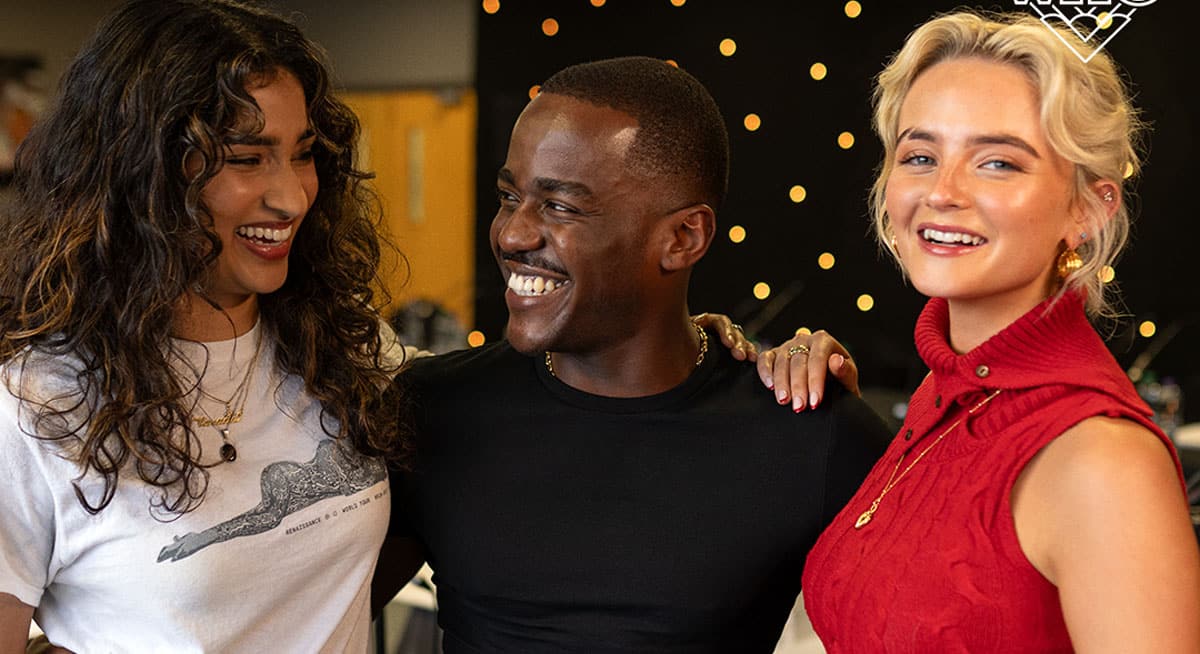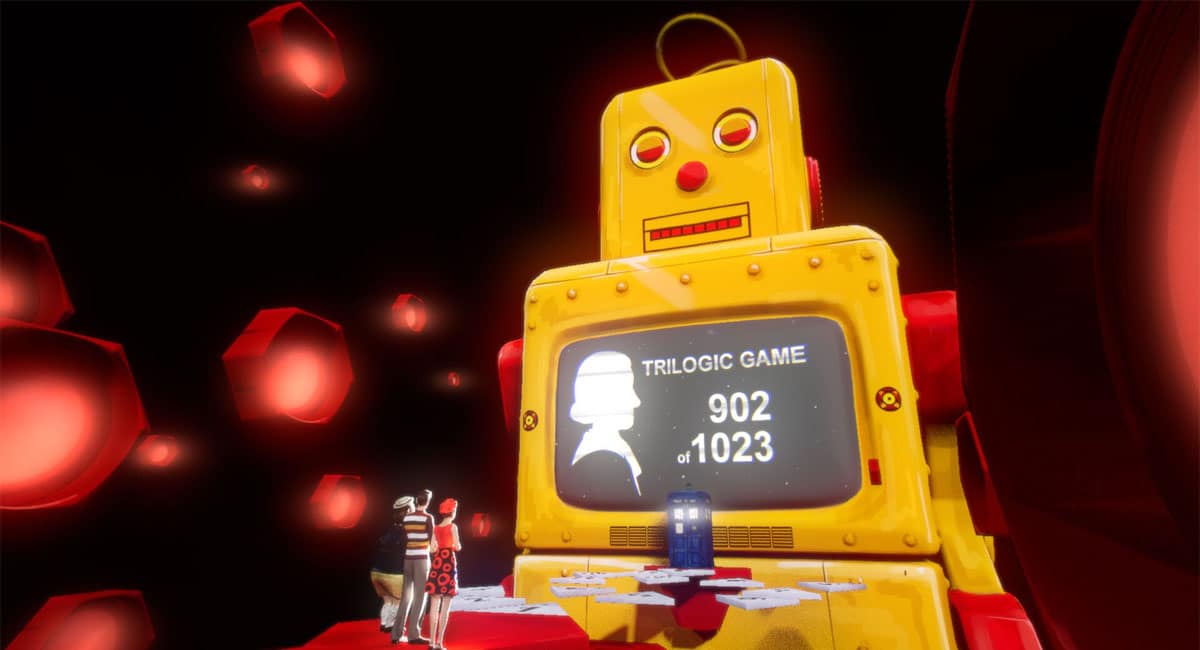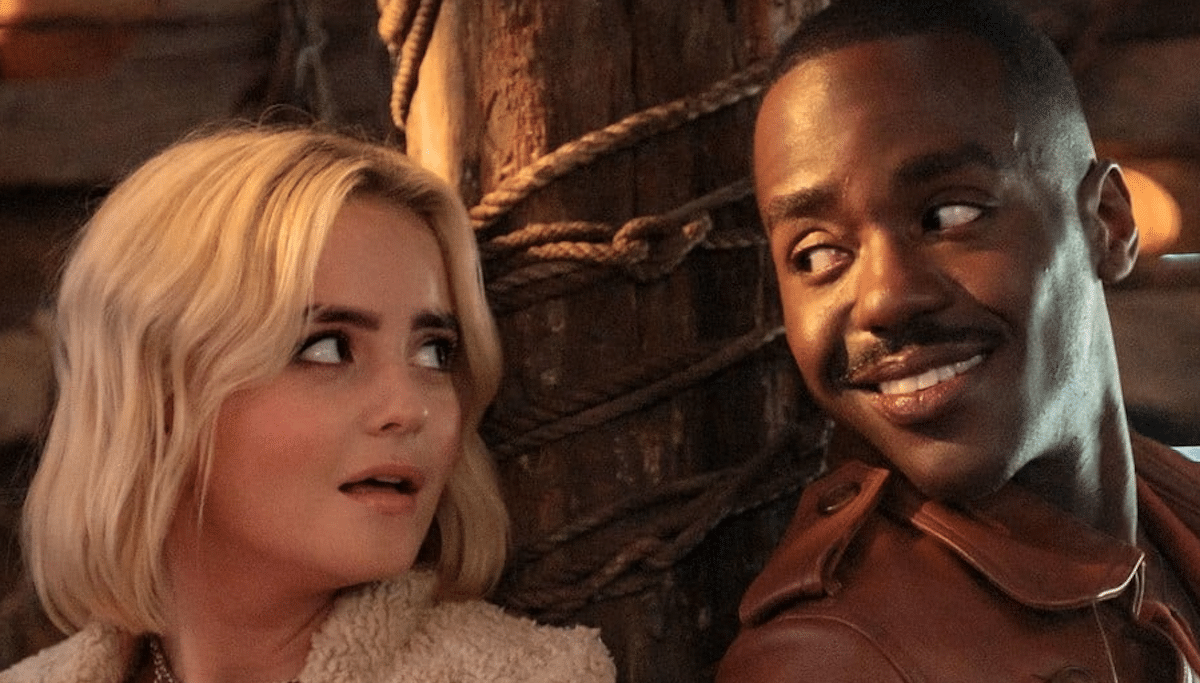If only a few years ago, someone would have told me that one of the most affecting and nuanced shows on television about existential dread, reconciling with depression, and the limits of celebrity would star a talking horse, a Persian cat, and a dog running for governor, I would have said that person was crazy. But, here we are four seasons later, and BoJack Horseman is not only one of the best original shows on Netflix, but one of the finest episodic meditations that delves right to the heart of what plagues those struggling to find their way in the world. We here at the Comics Beat have grown to love (and dread) the antics of BoJack (voiced by Will Arnett) and his crew. With the recently-released season 4 now available and ready to be binged, Beat managing editor Alexander Lu and staff writers Taimur Dar and AJ Frost sat down to discuss the season in a special Animation Round-Up.
**Spoilers abound!**
AJ FROST: Hey guys. Thanks for sitting down to chat today. Now that season four of BoJack has been out for a few weeks now, what were your thoughts about the season?
TAIMUR DAR: Without a doubt, BoJack season 4 is another winner. I’m still amazed they can maintain consistent quality after four season. Unlike, say, certain superhero shows on Netflix.
FROST: Ouch!
ALEX LU: Let’s be real. Netflix deserves a little bit of pain. Their data-focused ideology towards creating content has proven to be profoundly successful at generating, by and large, intensely mediocre programming. Their initial offerings like House of Cards and Orange is the New Black offered first seasons that were quite strong, but as time has gone on, both those shows and a majority of their other offerings have become somewhat bland digital-era versions of what we had come to expect from typical network dramas with only a slight hint of the prestige format that originally inspired them.
With that in mind, it’s amazing to me that BoJack has managed to stay remarkably consistent, and perhaps even improve from season to season every year. Not that I’m complaining! I found this season a little bit less outstanding than last year’s profoundly moving season overall. But it’s still three steps above almost everything else on the platform.
FROST: I definitely agree with that. I think what BoJack brings to the table is the ability to stay true to itself without succumbing to the lamentable fact that most Netflix shows become style over substance. My initial feelings towards season four was that, after the crushing ending of Season three, what sort of emotional horrors would we viewers be subjected to this time around? And while there are many many lows for the characters throughout the season, the fact that there is also—finally—a ray of hope by the end is stark move forward.
But maybe we’re moving ahead of ourselves. What were some of the highlights of the season for you as a whole? Did you guys end up binging it, or watching it in chunks?
LU: I think typically, in the past, I’ve watched BoJack in chunks over an extended period of time. Part of that is just because I don’t really have the attention span or inclination to binge— it’s hard for me to watch more than few episodes of TV at a time without breaks to process or at least go for a walk. BoJack, in particular, was also just difficult for me in a similar way to how The Leftovers was. It was just a little too heavy to take on in large doses.
That said, I binged the hell out of this season, finishing it about three days after release (if this doesn’t count as binging, sue me. I can’t watch six hours of anything straight). I think a big part of the reason why I was able to do that was because, as you mentioned AJ, this season was a little less actively morbid and had more hopeful undertones to it. Another part of it though, I think, was just the fact that this season was a little more unapologetically absurd than the ones that came before it. I don’t think that, in the previous seasons, Todd’s (Aaron Paul) INSANE CLOWN POSSE would have become an entire season-long plot line.
FROST: Yeah, I see what you mean. The way this show balances completely bonkers gags with soul-rending drama is unlike any other show I’ve ever seen. I don’t think any other show has inspired me to do so much soul-searching and inner reflection while also making me laugh so hard.
DAR: I watched it in big chunks over two days. Very easy and manageable. I actually binged the three previous seasons beforehand and never found myself bored for a second. BoJack is one of those rare shows perfectly made for repeat viewings.
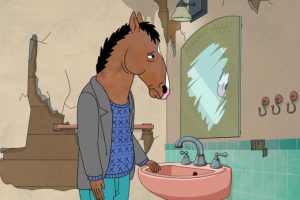
FROST: Let’s talk about the characterization. For those that watch BoJack (the show) and BoJack (the character), there’s something fascinating about getting used to the notion that these animal-people embody so many complex emotions. What did everyone think, generally, about the arc of this season, and about BoJack’s relationships to his friends and family?
DAR: Motherhood was a huge theme in this episode whether it was Hollyhock’s search for her mother (more on her in a bit), BoJack’s mother Beatrice, or Princess Carolyn’s attempt to start a family. Wendie Malick does some of the best voiceover work this season as BoJack’s mom as both a child and an adult. Don’t know if we want to discuss it now or later but standout episode has to be “Time’s Arrow” [the season’s penultimate episode] where we experience POV of BoJack’s mother suffering from dementia.
FROST: The episodes focused on BoJack’s mother were harrowing. But let’s be honest, she’s never been a well-liked character. The strength of the writing this season transformed her from a stereotype, to a three-dimensional person (horse?) we can empathize with.
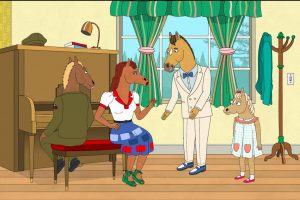
LU: Yeah. Beatrice, early on, is relatively one-dimensional, simply popping in to berate her son every once in a while. Re-contextualizing her and by extension, her husband Butterscotch, is interesting though because I think it completely re0contextualizes BoJack’s own childhood. Throughout the first three seasons, BoJack’s childhood is characterized as troubled, but consistently upper class. We’re never given any reason to assume that he is anything but the product of “old money” and a bad marriage. As we see though, that isn’t quite the case. Indeed, although Beatrice Sugarman is the product of legacy, she actually starts off her life as incredibly progressive, running off to marry a penniless beatnik. It’s only after years of poverty does she and her husband, Butterscotch Horseman, finally turn back towards the Sugarman side of the family for monetary security.
So now we have this character, BoJack, who is not just the product of a conservative household but rather a household that saw its more progressive ideals dashed early on. That gives us a much better idea of why he sees things as so hopeless from the start.
He doesn’t see the capacity for change because change, throughout his family history, has either been dashed or actually been for the worse (Beatrice’s mother’s lobotomy, anyone?!).
FROST: I think if anyone had a bad time this season, it was Princess Carolyn (Amy Sedaris) above all. Alex, what did you think about the collapse of PC’s personal life in relation to the larger narrative arc of the season?
DAR: By the end of the season when BoJack finally seems to have forged a meaningful and stable relationship with Hollyhock, who is revealed to be his half-sister, the relationships of the show’s supporting cast fall apart be it Princess Carolyn and her boyfriend Ralph Stilton and her assistant Judah or Mr. Peanutbutter and Diane. I was really hoping Diane and PB would last so I’m still holding out they don’t end their marriage in season five.
LU: I do want to talk about PC, but I want to stick on Joseph Sugarman for a second. I think he’s a really fascinating character in a lot of ways. The show makes it VERY easy to hate him because he does do a lot of terrible things. The lobotomy is paramount among them but is, in a lot of ways, simply the culmination of a number of more subtly harmful actions.
I think the show definitely wants you to question whether or not Joseph is really evil or simply the product of his time. Like he explicitly says at one point, society didn’t equip men to handle emotions. But I think what makes him truly evil, in my mind, is that he doesn’t even try. He simply jumps to using an external solution to an internal issue. And then, when he finally sees how much harm he’s done to Honey, only expresses regret by saying if he knew it’d be this much trouble, “I hardly would’ve bothered.” As though Honey’s inability to act with a cognizance of her surroundings is simply a bigger nuisance than her grieving.
FROST: Oh my God… What a horrifying revelation. Jane Krakowski’s guest turn [as Honey Sugarman, Beatrice’s mother] was a highlight for the season, as was Matthew Broderick’s, who for all intents and purposes, is one of the best villains the show has offered viewers. But the most fascinating aspect of that villainy is that it is all in through the lens of supposed benevolence. Beatrice’s father never meant to be cruel. He was just following the norms of behavior and what he thought was the right thing to do. His attitudes strike a nerve, but he is a product of his time.
Besides BoJack’s journey with his mother and (spoiler alert: half-sister), the season spent a lot of time exploring the lives of its supporting cast to a degree we haven’t seen before. Let’s talk first about Princess Carolyn, BoJack’s non-quite manager.
LU: But yeah, Princess Carolyn…oh boy. She really can’t catch a break in this season. Her character arc is a little harder for me to process because I think so much of what happens to her this year doesn’t happen because of anything she did. It was easy to criticize her for making bad choices last year when she was playing a more active role in causing things to happen throughout the world of the show, but this year, she’s a much more passive character and bad things just keep. on. happening. to. her. So it’s hard to really say that I feel anything but terrible for her.
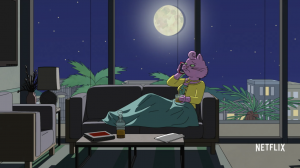
I guess one thing I want to consider is what it means for her to get away with forging BoJack’s signature on a five-year contract at the end of this season. I think the intent with that plot point was to say more about how BoJack has changed than cast judgment one way or another on Princess Carolyn, but…in a way, she essentially was allowed by the logic of the story to commit a crime without repercussions. Despite all the terrible things that happened to her, can we really call that a win? Or even karmic justice?
FROST: That’s an interesting question. On the face of the karmic justice, I think we finally have BoJack taking the lead on this this season. For all his faults, he’s taking heed of the admonition to be better every day (“But ya gotta do it every day… that’s the hard part”) and is starting to come around that he has to be more active in being a better friend, even if the circumstances aren’t in his favor. And PC’s journey this season was certainly the most devastating, and a nice narrative contrast from last season.
LU: There’s this weird commonality between Princess Carolyn’s storyline this season and Walter White’s arc in Breaking Bad, actually. Both characters were essentially dealt terrible hands by the universe and, desperate to regain a semblance of control, made a bad decision. I’m sure I’m reaching a bit here, but I do think that’s the central idea behind PC’s storyline. How do you cope with a random universe? Do you attempt to find a foothold in the unceasing sea of noise or do you roll with the tide?
DAR: Very apt point Alex!
FROST: Though, in Breaking Bad, wasn’t a lot of what Walter thought had happened to him on a karmic level through his own sense of hubris? Do you think Princess Carolyn’s miscarriage woes and the crumbling of her personal life is because of that?
LU: To some extent, AJ, yes. Although I wouldn’t necessarily call it hubris so much as I would call it being caught in the incredibly difficult web that all women are caught in in American society. PC’s central question throughout the whole show has been “can women have it all?” Can a woman have a successful career AND a successful family? What are the barriers to that? How and can they overcome them?
America has never been kind to women, offering much less maternity leave than any other first world country and holding them to the same standard as men professionally while simultaneously expecting them to fulfill a role as the spine of their family.
FROST: Taimur, what are you’re thoughts on the matter?
DAR: The “Ruthie” episode [the ninth of the season] devastated me when we find out PC’s future descendant is actually a fantasy of Princess Carolyn. However, I like to think it can be interpreted as reality as well if you choose. I personally lean towards it being reality because Todd’s drone throne appears in the future and PC’s imagination wouldn’t think to put in that detail. But that’s just me being optimistic.
LU: I want you all to know that “Ruthie” is, narratively, 100% “A Symphony of Illumination” from How I Met Your Mother season 5. You know it. I know it. The show knows it because it made a Josh Radnor reference earlier in the season.
FROST: Good points! “How easily we forget!” Let’s move onto the turbulence that was Diane (Alison Brie) and Mr. Peanutbutter’s (Paul F. Tompkins) marriage. What a roller coaster ride, right?
DAR: Obviously, Mr. Peanutbutter’s governor election story was an unabashed commentary on last year’s presidential election. By now there’s an a deluge of comedic storylines in media on the last presidential election and so there isn’t much new to say about it. That said, I was highly entertained by PB and eventually Jessica Biel’s (Jessica Biel) election campaigning.
FROST: Jessical Biel’s turn this season hilarious. Nice to see her make fun of herself.
LU: THE FIRE IS MY NEW GOD.
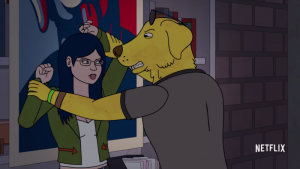
FROST: But what about Diane and Mr. Peanutbutter? Let’s expand on this thought. We’ve seen elements of how toxic they can be together, even thought Mr. PeanutButter puts up a nice facade of always being happy-go-lucky. What does it mean for the show to delve so deep into their troubled relationship?
LU: I think it’s interesting to see how PB’s and Diane’s relationship finally unravels here. They were never great for one another but like Diane said, if you squinted you could see how they would work. And while, in fairness, I believe that you have to squint and work at most relationships, I do think that PB is ultimately in the wrong with Diane. It seems like what he really wants out of a wife is someone who will, as his ex Katrina puts it, just “stand there and be supportive.” However, he constantly goes after these very career oriented, independent women. From what we know about Katrina, Jessica, and Diane, I can’t imagine any of them being the girl who stands in the background of all her husband’s photos.
And he is kind of caustic as a husband, constantly telling Diane he’ll take her feelings into consideration but then going off to do whatever he wants to anyways. He always listens to the superficial thing that Diane is saying without getting at the core of what she actually wants, which results in that terrible, terrible gift at the end of the season. I mean come on. A library full of FAKE BOOKS?! I don’t think he means ill. He just doesn’t know what he really needs out of a relationship.
DAR: Fun tidbit I only discovered after binge watching every season recently: in the second season epuside “After the Party,” Mr. Peanutbutter creates a ballroom for Diane for her birthday. Two seasons later and we find out Diane meant Belle room. Small but brilliant callback from the show creators.
FROST: That scene really encapsulates the gap in their personalities. Diane is the product of a broken home and naturally gravitates towards her inner desires, but doesn’t act on them. She’s vulnerable with her feelings and rarely shares her deepest desires. I agree, PB doesn’t mean harm when he makes his grand moves, but at the same time, he doesn’t have the awareness that his actions can be seen as negative on a micro-level. And Taimur, yeah! It’s those small pieces of continuity that make the show special.
What were both of your thoughts on the introduction of Hollyhock, who we are led to believe at the beginning of the season to be BoJack’s long-lost daughter? What did the energy of that character bring to the show?
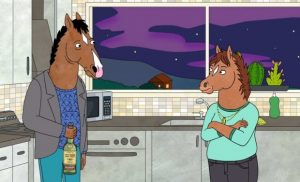
DAR: Hollyhock certainly shared some family traits with BoJack like her laziness getting Todd to clean up the house by himself. But over time as we got to know her more, she obviously brought out the best in BoJack.
LU: What I really appreciated about Hollyhock was how the show dealt with her own struggles with anxiety and depression. While it’s never particularly explicitly explored, we do get the sense that she suffers from the same mental diseases that afflict BoJack. It manifests in the way she develops body issues during her time in LA and in the conversation that she has with BoJack about the internal voice that tells her she’s not good enough. I think it’s incredibly important and moving that she does deal with these issues because she comes from an INCREDIBLY stable and loving home. We often characterize mental illnesses as something that only befall outcasts or people from bad homes. They can cripple anyone and indeed, are often hereditary.
FROST: Hollyhock was such a nice addition to the show. It’s nice to have a character who is inherently positive, even if she does have to deal with the Horseman genes of depression and anxiety. Aparna Nancherla did a great job of giving Hollyhock the perfect balance of pathos and silliness.
LU: I am VERY glad that we got to spend some time with her eight dads. It’s great to see a character on this show who has some semblance of stability and is reaching for something higher rather than just struggling to stay afloat. The way they handled her body issues plot line was incredibly deft as well. I didn’t realize what was happening until she collapsed, which was absolutely intentional, but looking back you can see signs seeded everywhere. The way that BoJack reacts to drinking the coffee in the opening credits to how Hollyhock has gotten to the point where you can see her hip bones as she stands up and has to pull up her pants.
FROST: Agreed. The subplot where she overdoses on amphetamines was harrowing.
DAR: Thinking about it, with Todd wanting to separate from BoJack, Hollyhock was a nice foil to BoJack without being a “poor man’s Todd” as it were. Speaking of Todd, I normally love him and his shenanigans but his story felt off to me this season. Also bringing in the whole asexual dynamic. Maybe it’s because the whole controversy of people having a problem with Jughead not being asexual in the Riverdale’s show had me rolling me eyes, but Todd’s whole asexual journey had me scratching my head if this was meant to be deep or another colorful commentary.
LU: I actually disagree with you on Todd, Taimur. I really wanted to touch on Todd’s storyline because I think it was handled in such a lovely fashion. It was so refreshing to see a character grapple with exploring their sexuality in a nuanced and earnest manner. Watching him go to ACE meetings and learn about the difference between asexual and a-romantic and then discover, in some form, romance, was great. I do think that, perhaps, the tone of his arc was a little weird given that we’d switch from the earnestly revealing material to his incredibly strange clown doctor venture, but that’s more of a nitpick than something that ruins his arc for me.
FROST: Gentleman, in only a few words, give me your final thoughts on the season. And where do you want to see the show go next season?
DAR: I’m looking forward to BoJack’s next in show project for whattimeisitrightnow.com as Detective John Philbert. Sure we’ll get more of the show’s wonderful meta narrative comedy.
LU: I honestly don’t have any particular ideas for where I want BoJack to go. I think it’s proven itself capable of veering off in several different directions at once and while still maintaining a unique level of quality, so I’m sure whatever they decide to do will be excellent. And honestly, I don’t want to think about it too much so I can be surprised!
The one thing I do NOT want them to do is to play with BoJack getting together with Diane again. I think it was great to explore that in the first season but, especially after watching them get black out drunk for weeks on end as friends in the underground episode this year, I really want to them to hold onto that platonic male-female friendship dynamic. I think it’s an important and underrepresented one to have in television.
FROST: Guys, thank you for thoughts and commentary. I just want to say that I loved this season of BoJack immensely. Hats of to all the writers, and creatives on the show, including Lisa Hanawalt (production designer) and Raphael Bob-Waksberg (creator). I think they really stepped up their game in interesting ways. The only downside is that we have to wait an entire year for new episodes!
LU: OH THE HORROR! OH THE HUGE-MANATEE!
DAR: BoJack may be a tough show at times to get through due to all the heavy and at times depressing material. But trust me, stick to it and by the end you’ll be rewarded at the end with signs of hope and optimism.




